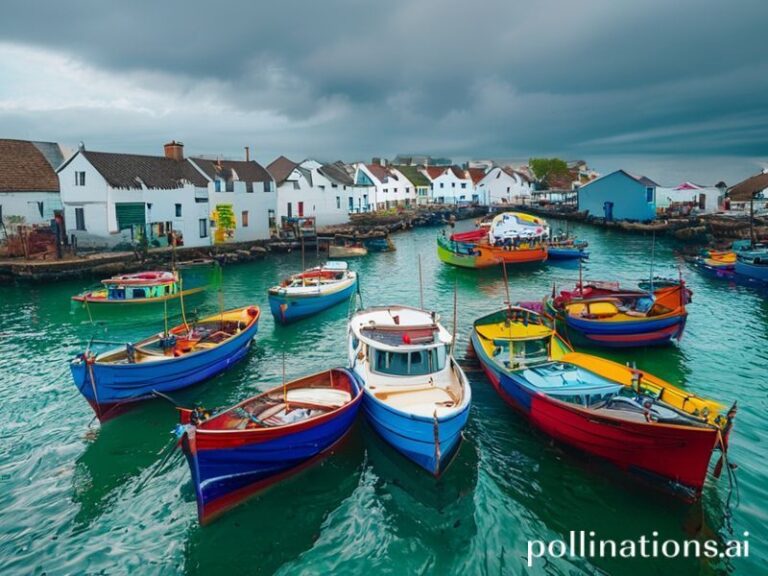Island Hustle: How University of Hawaii Football Sells Jet-Lagged Imperialism One 8-Million-Dollar Loss at a Time
HONOLULU—While European ultras were torching stadium toilets and Qatari sheikhs were gold-plating their private boxes, the University of Hawaii Rainbow Warriors spent Saturday night doing something far more subversive: playing earnest, mid-tier American football on the outer rim of civilization, 2,400 miles from the nearest conference rival and precisely one ocean away from anyone who truly cares.
To the international eye, this looks like a quaint Pacific postcard—palm trees swaying over a half-empty Aloha Stadium, the marching band plinking out a ukulele-flavored fight song, jet-lagged tourists wondering why the clock keeps stopping. Yet the spectacle is quietly symptomatic of the planet’s ongoing commitment to fiscal surrealism. Hawaii’s athletic department hemorrhaged roughly $8 million last season, a figure that would shutter several small island nations but barely registers in the NCAA’s Grand Canyon of red ink. Somewhere in Lausanne, an IOC accountant sighs with envy.
Globally speaking, the Rainbow Warriors are a geopolitical paradox: an American football team marooned in Polynesia, representing the 50th state yet recruiting half its roster from the same California suburbs that supply Netflix extras. It’s imperial outreach disguised as higher education, subsidized by airline miles and the delusion that television revenue can outrun geography. The Mountain West Conference, desperate for a footprint in the Pacific, tolerates the travel subsidy the way Brussels tolerates Malta—cute flag, questionable ROI.
Still, the program serves a larger, darker purpose: it keeps the American security umbrella pleasantly distracted. Every Saturday, 25,000 locals and a few sunburned Australians temporarily forget that the Indo-Pacific is one miscalculation away from becoming a very large bathtub of contested shipping lanes. Instead, they argue over whether the run-pass option was correctly executed, a discussion that translates seamlessly into any language willing to ignore the scoreboard.
The environmental optics are equally edifying. To entertain roughly 1.2 million television insomniacs, teams burn 30,000 gallons of jet fuel flying in opponents who, by contractual obligation, must pretend the trip is educational. That’s the carbon footprint of a Maldivian nation-state, all so a fourth-string safety from Reno can post a beach selfie captioned “#RoadTrip.” Greta Thunberg would self-immolate, but she can’t get a direct flight.
Financially, the model is pure performance art. Hawaii receives a $2.5 million guarantee to play at Ohio State, money the Buckeyes print from their own cable-network Xerox machine. The Rainbow Warriors then turn around and pay $1.8 million to lure an FCS opponent—effectively laundering money through the minor leagues like a developing-world central bank. Somewhere, an IMF intern is taking notes.
Yet the real punch line is cultural. American football, that most insular of pastimes, has somehow convinced an archipelago colonized by missionaries and pineapple conglomerates that its regional identity depends on a sport invented in New Jersey. Children who will never leave the islands dream of playing in stadiums they’ll never fill, wearing armor under a sun that melts plastic. It’s the sort of soft-power coup the British Empire once achieved with cricket, only with more concussions and less tea.
In the broader ledger of global priorities, Hawaii football is irrelevant the way a stray jellyfish is irrelevant to aircraft-carrier operations: painful if you step on it, but hardly mission-critical. Still, the world keeps watching, half-throttled by insomnia and half-hypnotized by the existential joke—an empire broadcasting its decline in high-definition, one play-action pass at a time, while the Pacific slowly rises to claim the end zone.
When the final whistle blows and the band segues into a luau-themed rendition of “Sweet Caroline,” you realize the score never mattered. The real victory is convincing taxpayers on five islands that deficit-induced drowning is just another wave worth riding. Somewhere across the dateline, a Chinese naval officer logs the attendance numbers, quietly amused that America’s furthest frontier chooses to defend itself with shoulder pads and a marching snare.







